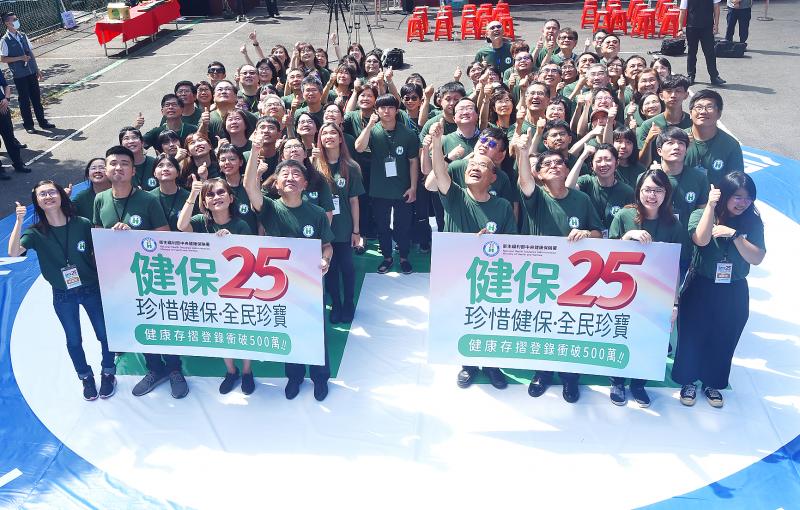The National Health Insurance Administration (NHIA) yesterday thanked the public and healthcare providers for their long-term support as it celebrated the 25th anniversary of the National Health Insurance (NHI) program and the record-breaking number of registers on its “My Health Bank” service.
The second-generation NHI, launched in 2013, covers 99.84 percent of the population, or about 23.9 million people, with nearly 93 percent of the nation’s medical institutions taking part in the program, agency Director-General Lee Po-chang (李伯璋) said at the anniversary event.
Launched in 2014, My Health Bank — a service that allows NHI members to register for an account on the online system and view their medical history on its Web site or mobile app — now has more than 5 million registered members, Lee said.

Photo: Liao Chen-huei, Taipei Times
The service also allows direct blood relatives to check the medical history of family members, he added.
The NHI has a 90 percent satisfaction rating among the public, Premier Su Tseng-chang (蘇貞昌) said, adding that it is an exemplary model that government agencies should look up to when providing public services.
Following the introduction in February of the government’s real-name system for mask rationing amid the COVID-19 pandemic, the number of My Health Bank accounts increased from 1.68 million to 5 million, Su said.
Promoting the health-monitoring service was initially difficult, but the government’s disease prevention measures, including travel history tracing and mask rationing, have contributed to the surge in its users, Minister of Health and Welfare Chen Shih-chung (陳時中) said.
A crisis can also be an opportunity, so it is important to make early preparations and keep a positive mindset, Chen added.
In related news, the NHIA plans to double the annual funding for medical compensation to healthcare institutions to NT$12.3 billion (US$417.15 million) as part of the nation’s efforts to improve overall healthcare quality, with a focus on critical care, nursing and medicine-related services fees.
The fund was last increased in 2017, when it was raised to NT$6 billion, the NHIA said.
The proposal would allocate NT$10.3 billion to hospitals for compensation for critical care and medicine services, among other items, it said.
Clinics would receive NT$2 billion for compensation in critical care, inpatient services for internal medicine, the establishment of barrier-free facilities and other services, it said.
The proposed budget, which is still under review, would take effect on Jan. 1 next year at the earliest.

Auckland rang in 2026 with a downtown fireworks display launched from New Zealand’s tallest structure, Sky Tower, making it the first major city to greet the new year at a celebration dampened by rain, while crowds in Taipei braved the elements to watch Taipei 101’s display. South Pacific countries are the first to bid farewell to 2025. Clocks struck midnight in Auckland, with a population of 1.7 million, 18 hours before the famous ball was to drop in New York’s Times Square. The five-minute display involved 3,500 fireworks launched from the 240m Sky Tower. Smaller community events were canceled across New Zealand’s

The Ministry of Foreign Affairs (MOFA) yesterday said it is closely monitoring developments in Venezuela, and would continue to cooperate with democratic allies and work together for regional and global security, stability, and prosperity. The remarks came after the US on Saturday launched a series of airstrikes in Venezuela and kidnapped Venezuelan President Nicolas Maduro, who was later flown to New York along with his wife. The pair face US charges related to drug trafficking and alleged cooperation with gangs designated as terrorist organizations. Maduro has denied the allegations. The ministry said that it is closely monitoring the political and economic situation

UNRELENTING: China attempted cyberattacks on Taiwan’s critical infrastructure 2.63 million times per day last year, up from 1.23 million in 2023, the NSB said China’s cyberarmy has long engaged in cyberattacks against Taiwan’s critical infrastructure, employing diverse and evolving tactics, the National Security Bureau (NSB) said yesterday, adding that cyberattacks on critical energy infrastructure last year increased 10-fold compared with the previous year. The NSB yesterday released a report titled Analysis on China’s Cyber Threats to Taiwan’s Critical Infrastructure in 2025, outlining the number of cyberattacks, major tactics and hacker groups. Taiwan’s national intelligence community identified a large number of cybersecurity incidents last year, the bureau said in a statement. China’s cyberarmy last year launched an average of 2.63 million intrusion attempts per day targeting Taiwan’s critical

‘SLICING METHOD’: In the event of a blockade, the China Coast Guard would intercept Taiwanese ships while its navy would seek to deter foreign intervention China’s military drills around Taiwan this week signaled potential strategies to cut the nation off from energy supplies and foreign military assistance, a US think tank report said. The Chinese People’s Liberation Army (PLA) conducted what it called “Justice Mission 2025” exercises from Monday to Tuesday in five maritime zones and airspace around Taiwan, calling them a warning to “Taiwanese independence” forces. In a report released on Wednesday, the Institute for the Study of War said the exercises effectively simulated blocking shipping routes to major port cities, including Kaohsiung, Keelung and Hualien. Taiwan would be highly vulnerable under such a blockade, because it